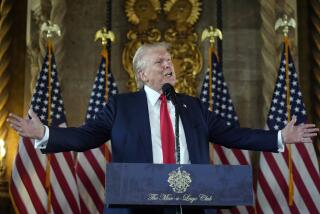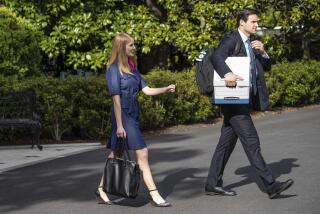Starr Juror Says She Would’ve Voted to Indict Clinton
- Share via
WASHINGTON — Stepping from behind the grand jury’s wall of secrecy, the forewoman in the Monica S. Lewinsky inquiry said she sympathized with President Clinton but would have voted to indict him for perjury if prosecutors had asked.
In an interview from her Washington home, Freda Alexander described her 18 months on the grand jury as emotionally intense. She defended independent counsel Kenneth W. Starr but said she sometimes felt sorry for Lewinsky and presidential secretary Betty Currie as they were pressed to testify about the president. She portrayed Linda Tripp, the co-worker who turned Lewinsky in to prosecutors, as determined to damage Clinton.
Jurors are forbidden by law from disclosing what goes on in the grand jury room. But Alexander, 46, said she thought she could talk about the Clinton case now because so much of it was made public after Starr’s report to Congress. She said she might even write a book.
Starr’s office had no comment.
Alexander, whose grand jury service ended last week, said she believed that Clinton’s transgressions were so personal they never should have been made public, much less become grounds for impeachment.
“You know when your mother says, ‘Don’t make a federal case out of it’? They were making a federal case of it,” she said.
But she said Clinton wasn’t honest with the grand jury about his relationship with Lewinsky, a former White House intern. She was offended by his assertion that “a reasonable person” would define “sexual relations” only as intercourse.
“If they had asked if he committed perjury, I would say yes,” Alexander said. Still, she believes seeking an indictment would have been “overkill.”
“What’s a man supposed to do, when they’re trying to protect their family and not hurt innocent people?” she asked.
She believes there wasn’t enough evidence for a criminal indictment of Clinton for obstructing justice by covering up the affair--the other charge considered in the Senate impeachment trial along with perjury.
Nonetheless, Alexander said that it was proper for the grand jury to investigate the Lewinsky matter and that Starr was unfairly demonized for doing his job.
Instead, she blamed the independent counsel law for giving too much power and unlimited money to prosecutors.
Alexander, who is black, said investigating the president was “very difficult” for her because she “had a very high regard” for Clinton for appointing minorities to high-level administration jobs.
She said she believes Lewinsky paid a high price for youthful mistakes. The former White House intern’s testimony about being confronted by Starr’s prosecutors was so moving--”there were very few dry eyes” in the room--that Alexander hugged her at the end.
Michael Ross, a criminal defense lawyer and expert on grand juries, called it “a little bit of a shock” that Alexander discussed the case. He said the fact that much of the panel’s work has been disclosed publicly does not necessarily free her from adhering to secrecy rules.
Grand jurors’ names are not released by federal courts. Alexander was first identified in a weekly newspaper that covers conventions and hotels, which published a story saying she was suing a hotel that fired her during her grand jury service. She would not comment on the lawsuit.
While not revealing other grand jurors’ reactions, she spoke openly about her own impressions of the witnesses and prosecutors:
* She believes Tripp’s “mission was to do as much damage as possible to Clinton” and to gather material for a book.
* Recalling how Marcia Lewis, Lewinsky’s mother, broke down crying while being questioned about her daughter, Alexander said, “I hope I never see anything like that again.”
* She criticized a prosecutor, whom she would not identify, for curtly telling Currie on her final day of testimony to “just sit down.” “There was no reason to be rude,” Alexander said.
More to Read
Sign up for Essential California
The most important California stories and recommendations in your inbox every morning.
You may occasionally receive promotional content from the Los Angeles Times.













